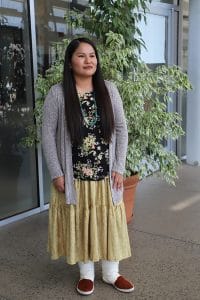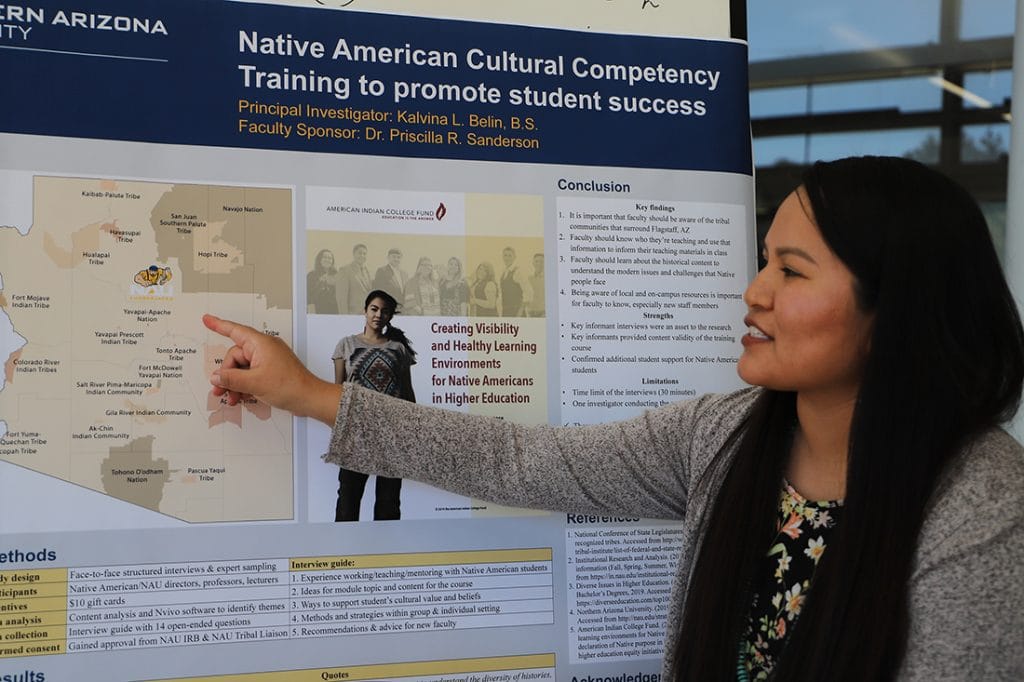“My name is Kalvina Lee Belin––I am of the Bitter Water clan, born for the Coyote Pass clan. The Tangle people are my maternal grandfather, and the Salt people are my paternal grandfather.”
“That is how I identify myself as a Diné (Navajo) woman.”
Belin is a newly minted graduate from Northern Arizona University’s master of public health program with an emphasis in Indigenous health. She wanted to know whether other Native American/Indigenous students feel that they belong. So she turned that question into a master’s thesis.
For her graduate project through the NAU Department of Health Sciences and with faculty mentor Priscilla Sanderson, Belin developed a pilot version of a Native American Cultural Competency Program for NAU faculty and staff to help students who are Native American/Indigenous “feel encouraged and supported throughout their educational pursuit.”
Belin’s work is supported by the Navajo Native American Research Center for Health (NARCH) Partnership, a collaboration between Diné College and NAU’s Center for Health Equity Research, which is co-directed by Nicolette Teufel-Shone, associate director of CHER and a professor in the Health Science Department, as well as other external funding.
NARCH has been key in developing and shaping NAU CHHS’s new master of public health program, Indigenous health track. Enhancing the cultural competency of NAU will contribute to making this program a positive educational experience for students.
“The faculty in Health Sciences wanted to know more about how they could support Native American students, so they recommended that I take this on as my grad project,” Belin said. “Since then, I have gotten requests from other staff and faculty to implement this training within their department, too.”

To develop the pre- and post-training modules in Blackboard Learn (BbLearn), last summer Belin interviewed NAU directors, professors and lecturers, whose work is dedicated to supporting Native American students on campus. Through her questions, she found that, in order to retain Native students, all faculty members and staff needed an awareness of the tribes in Northern Arizona and “their cultures, histories, and presences.”
Belin then created the Native American Cultural Competency Training through BbLearn, with assistance from the e-Learning Center, that she piloted with faculty and staff during the winter semester of 2019.
Samantha Clifford, instructional designer in the Teaching and Learning Center, assisted Belin with the course design and pedagogy for the training. Clifford said the project is important for faculty, staff and students because it will help increase awareness of the challenges Native American students face and offer a variety of ways to help students succeed.
“Research has shown that feelings of belonging are directly related to persistence and retention,” Clifford said. “The commitment to inclusion by the institution in supporting these efforts can make a significant impact upon individual lives as well as our educational community as a whole.”
Clifford said that offering a cultural competency training for faculty, staff and students will increase awareness of the challenges for students and offer multiple ways to help students succeed.
“The focus on understanding Native American student experiences will help shine a light on inclusive pedagogical practices across disciplines,” she said. “This focus can provide strategies and tools to help faculty and staff create spaces where Native American students feel they belong and are motivated in the learning process.”
In addition to her work with CHER, the Commission for Native Americans selected Belin as the recipient of this year’s Cal Seciwa Outstanding Student Award for her commitment to the Native American community at NAU. The committee said Belin had made “significant contributions in the areas of promoting full and equal access and inclusion for Native American individuals” at NAU and that she promoted a “campus climate that values Native American students faculty and staff.” She also received a President’s Diversity Award.
Belin said she hopes to find funding that will help her create a final version of the pilot training. She also hopes the training will become mandatory for all NAU staff, faculty, and students in the future.
“I hope that it creates positive changes for Native/Indigenous students who attend NAU and for all Native/Indigenous people that live and work in Kinłání (Flagstaff); however I know it will take more than just an online training,” Belin said. “But I do hope that it will spark more support, resources and involvement in Native/Indigenous initiatives from people, especially those in leadership roles at NAU and in the City of Flagstaff.”
Lisa Dahm | Center for Health Equity Research




